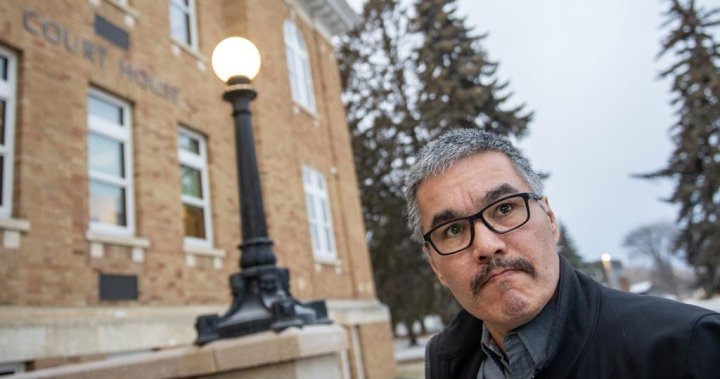Nova Scotia’s chief medical officer of health says New Brunswick has taken a risk by opening to the rest of Canada — one he is not willing to share until more time has passed to allow for vaccination rates to increase and COVID-19 transmission rates in the neighbouring province to be revealed.
Dr. Robert Strang made the comments Thursday at a COVID-19 briefing, defending the decision earlier this week to continue with quarantine requirement for most New Brunswick travellers, a move that sparked a border blockade on the main highway between the two provinces that lasted 24 hours.
“I have had sleepless nights and I do feel people’s frustrations in this pandemic, and the sacrifices we’ve all had to make to control it,” Strang said.
“I know you are tired and just want this to be over, but ultimately I have to make recommendations based on the available science while considering acceptable risk and what is best for everyone’s health and safety.”
Nova Scotia Premier Iain Rankin confirmed Thursday the province will open to New Brunswickers without restrictions starting June 30. Those who have had two doses of vaccine can also now enter Nova Scotia without isolating.
Strang said it comes down to risk tolerance. He said he and Dr. Jennifer Russell, New Brunswick’s chief medical officer of health, rely on the same scientific evidence, but disagree on what is an acceptable level of risk.
Starting June 16, New Brunswick stopped asking most travellers from other parts of Canada to quarantine upon entry, calling the formation of the Atlantic bubble into question.
Six days later, the day before the bubble was set to reopen, Premier Iain Rankin announced that most New Brunswickers would still have to quarantine before entering Nova Scotia. By contrast, people from P.E.I. and Newfoundland and Labrador were allowed to cross the border freely starting Wednesday.
New Brunswick offered to share data from incoming travellers with Nova Scotia border officials, allowing them to screen travellers from other parts of Canada, but that was evidently not enough to satisfy Nova Scotia’s decision-makers.
Strang said he wants more Nova Scotians to be fully vaccinated, giving greater protection against the highly transmissible delta variant of COVID-19, before lifting quarantine requirements from anyone entering through or from New Brunswick.

Strang said even though New Brunswick has not yet seen a surge in cases since opening up to the rest of Canada, he’s not satisfied it couldn’t still happen,
“Just because nothing happens — you may get lucky. You may take a risk and nothing happens to you. The next time you take a risk something bad may happen.”
Strang said he wants more Nova Scotians to be fully vaccinated, giving greater protection against the highly transmissible delta variant of COVID-19, before lifting quarantine requirements from anyone entering through or from New Brunswick.
“Once again I ask you to trust the premier, myself and the many skilled people giving advice.”
As of Wednesday, 71.9 per cent of Nova Scotians have received at least one dose of vaccine, including 13.4 per cent who have also received a second dose. Strang said he expects those numbers to rise quickly between now and June 30.
Rankin said additional vaccination clinics are slated to open soon, and existing clinics are preparing to expand their capacity. Hundreds of thousands of doses of both Pfizer and Moderna are expected to arrive in Nova Scotia in the coming weeks.
Five new cases reported
Nova Scotia is reporting five new cases of COVID-19 on Thursday.
All of the new cases are in the central health zone. Two are related to travel, two are close contacts of a previously reported case and one case is under investigation.
There are three people in hospital with the virus, including one in intensive care. The province has 59 active cases of the virus.
One case is connected to Joseph Howe Elementary School, which was announced late Wednesday but is being counted as part of Thursday’s figures because it was reported after the daily cutoff time, according to a news release.
There is also a case connected to St. Joseph’s-Alexander McKay Elementary in Halifax that was announced after the daily case count was reported, and will be included in Friday’s numbers. A news release from the province said the school will be closed to allow for testing of close contacts and a deep cleaning of the building.
Families and staff will be notified about reopening plans.

The school will be closed to students until Monday to allow for testing of close contacts and a deep cleaning of the building.
The school will inform families about at-home learning. Families and students will receive an update before June 28.
Out of an abundance of caution, Public Health is recommending that all students and staff be tested for COVID-19, whether or not they have symptoms.
Nova Scotia health authority labs completed 3,868 COVID-19 tests on Wednesday.
Atlantic Canada case numbers
- New Brunswick reported two new cases Thursday. It has 40 active cases.
- Newfoundland and Labrador reported no new cases on Thursday. It has 7 active cases.
- P.E.I. has reported no new cases since June 3. There are no active cases.







More Stories
Former Saskatchewan Mountie who shot lover in park to be sentenced for manslaughter | Globalnews.ca
Search for Kelowna senior with dementia goes into the backcountry – Okanagan | Globalnews.ca
Roxy Theatre in the running for the Next Great Save | Globalnews.ca